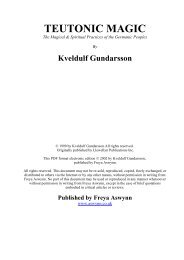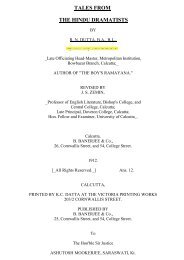Untitled - Awaken Video
Untitled - Awaken Video
Untitled - Awaken Video
You also want an ePaper? Increase the reach of your titles
YUMPU automatically turns print PDFs into web optimized ePapers that Google loves.
Chapter 2. Connections 45<br />
In early Germanic culture, wise men sought to interact with powerful and noble<br />
lineages which would provide them and theirs with luck and power. Only fools such<br />
as the unfortunate but greedy family of Hreidmar in the Saga of the Rheingold would<br />
blindly align themselves with a lineage without knowledge of its ørlög. Therefore,<br />
the long recitations of lineages of pre-industrial, pre-Christian cultures such as are<br />
seen in the well-known “begats” of the Old Testament were never meant to be merely<br />
a formality but were of absolute necessity.<br />
Tacitus in Germania spoke of the importance of omens and divination to the<br />
Germanic peoples of 2000 years ago. In the 20th century, we often think of divination<br />
as being either a parlor game or a serious way of glimpsing the future. But to<br />
the Germanic forebears, divination was a way to gain knowledge of the past and<br />
its effects on the present. Mark Twain in Life on the Mississippi describes very<br />
clearly how important it is for the captain of a paddle-wheel steamboat to know<br />
the conditions of the waters, both on the surface and underneath, for the sake<br />
and safety of the boat and passengers. Measuring the depth of the waters, or<br />
“sounding,” was used in close conjunction with visual inspection of the surface to<br />
make determinations on passabilty. The exact same reasoning was used for the<br />
existence of divination among the northern people: testing or “sounding” the past<br />
with all its connections between events and inspecting the present to determine<br />
the proper course of action to be taken. Divination, then, had little or nothing<br />
to do with the future and certainly nothing to do with “predicting” events which<br />
had not yet come into being. It had only to do with gaining the wisdom of ørlög,<br />
those conditions which made up the present, so that the seekers of knowledge could<br />
advantageously place themselves within the flow of power.<br />
The early Teutons have often been called a fatalistic group of people who believed<br />
that man’s destiny (future) was rewritten at birth. Snorri tells of this setting of<br />
“destiny”:<br />
“There stands one beautiful hall under the ash by the well, and out of this<br />
hall come three maidens whose names are Weird, Verdandi, Skuld. These<br />
maidens shape men’s lives. We call them norns. There are also other norns<br />
who visit everyone when they are born to shape their lives, and these are<br />
of divine origin, though others are of the race of elves, and a third group<br />
are of the race of dwarfs, as it says here: ‘Of very diverse parentage I think<br />
the norns are, they do not have a common ancestry. Some are descended<br />
from Æsir, some are descended from elves, some are the daughters of Dvalin.’<br />
Then spoke Gangleri: ’If norns determine the fates of men, they allot terribly<br />
unfairly, when some have a good and prosperous life, and some have little<br />
success or glory, some a long life, some short.’ High said: ’Good norns, ones
















